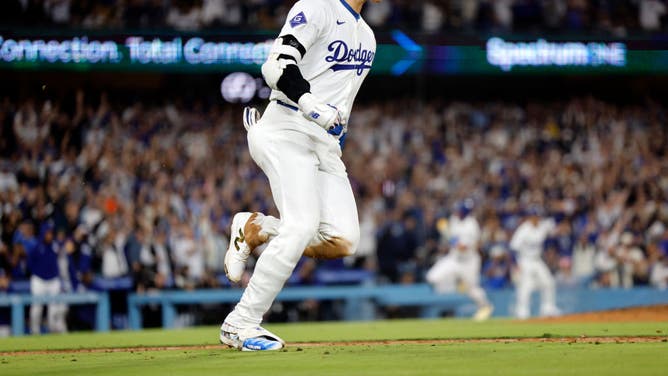We support our Publishers and Content Creators. You can view this story on their website by CLICKING HERE.
The Los Angeles Dodgers have become baseball’s villains. Playing a role formerly occupied by the New York Yankees, the Dodgers have used their incredible advantages to build the best possible team every year.
They draft well, develop players that they either keep or flip in trades for other valuable players, then leverage their wealth and revenue to sign the top available players most offseasons. This dynamic came to a head for fans of the other teams when the Dodgers signed Shohei Ohtani after the 2023 season.
Ohtani, arguably one of the best players Major League Baseball’s ever seen, received a then-record-setting $700 million contract. But with the fine print that 97 percent of it was deferred into the 2030’s and 2040’s. Fans were furious, seeing that the Dodgers had more payroll flexibility to use on other stars. Or pocket the profits.
They used it on other stars. Yoshinobu Yamamoto joined the team, Tyler Glasnow signed an extension. Will Smith signed for the rest of his career. Then more contracts were handed out, to Tommy Edman, Blake Snell, Teoscar Hernandez, Blake Treinen, Michael Conforto and Hyesong Kim.
Fans got even more upset. But ESPN’s Jeff Passan in his recent article on winners and losers of the offseason so far, painted a much kinder picture.
When talking about the massive deferrals, Passan said the Dodgers are unfairly blamed for the Ohtani deal.
“…not until Shohei Ohtani agreed to postpone payment on $680 million of his $700 million salary did it become a point of disillusionment for fans,” he wrote. “It doesn’t matter that Ohtani proposed the deal — and that he did the same with the Toronto Blue Jays and San Francisco Giants, both of whom said they would agree to it. The Dodgers are the team that got Ohtani, and because it is the team-friendliest contract in the game by a good margin, the Dodgers are the team that will be loathed for it.”

LOS ANGELES – Shohei Ohtani of the Los Angeles Dodgers hits a one run base hit against San Diego Padres during the seventh inning at Dodger Stadium on September 26, 2024. (Photo by Kevork Djansezian/Getty Images)
Dodgers Should Be the Model For Other Organizations
Passan continued, explaining that deferrals by themselves aren’t a recipe for success. Teams have to use that money wisely, and ensure that they have enough to cover future commitments.
“Deferrals themselves aren’t all that advantageous,” he wrote. “Teams still need to put away large sums of cash to cover the eventual payments. They’re a tool, not a strategy. The strategy for Los Angeles is to load up on high-ceiling talent, backfill with depth, ensure its farm system is always pumping out players and maximize its significant financial advantage with solid organizational practices. It’s easy to hate because it’s exactly what they should be doing.”
That’s exactly the issue. Teams aren’t following the Dodgers model because they’re too scared to do so, not because they can’t.
The Miami Marlins for example, have spent literally zero dollars in free agency this offseason. No, they don’t have the financial wherewithal that the Dodgers do, but they can definitely afford more than zero dollars in new commitments. And it’s not as if Miami’s a small market, relative to Cincinnati or Cleveland.
The Marlins should be where fans direct the anger; they’re the team that’s ruining baseball. Because they refuse to even try, instead focusing on profits over competition. The Dodgers are doing the opposite.

 Conservative
Conservative  Search
Search Trending
Trending Current News
Current News 





